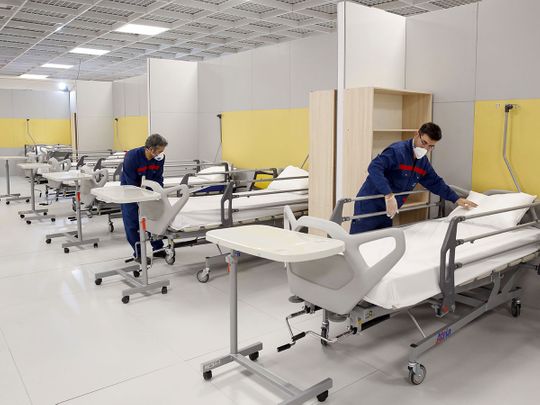
Tehran: Iran announced Saturday that 139 more people had died from the novel coronavirus, raising the official death toll to 2,517 in one of the world's worst-affected countries.
Health ministry spokesman Kianoush Jahanpour told a news conference that 3,076 more cases had been confirmed in the past 24 hours, bringing the total number of infections to 35,408.
Late Friday, Jordan announced its first death from the virus, a women in her 80s who had underlying medical conditions, according to state-run news agency Petras and Jordan TV.
There have been 235 confirmed COVID-19 cases in the Arab kingdom. On March 21, Jordan imposed an indefinite full lockdown after it had shut down its airspace and other border crossings.
Meanwhile, the US embassy in Riyadh said on Saturday it was working with the Saudi authorities to arrange repatriation flights to the United States on a commercial airline.
“No flights or departure/arrival locations have been confirmed at this time,” it said in a statement. “It is likely that flights will be scheduled with little advance notice.” Saudi Arabia on Friday reported 92 confirmed cases of coronavirus, bringing the total number of COVID-19 patients in the Kingdom to 1,104, according to the Ministry of Health.
In Yemen, meanwhile, the US Agency for International Development began scaling back aid efforts in areas controlled by the Iran-backed Al Houthi rebels over their resistance to allowing measures that ensure aid goes to those who most need it. Yemen has yet to record any coronavirus cases, but an outbreak in the war-torn country could be catastrophic.
In central Beirut, brief scuffles broke out between security forces and anti-government protesters who have been holding a sit-in there since October. Shortly before the nighttime curfew began on Friday, the security forces ordered the protesters to disperse but when one protester tried to set himself on fire, they moved in to take down the demonstrators’ tents.
Iran’s military said the new hospital it has set up in Tehran, which includes three units and several isolation wards, was built in just 48 hours. It will begin receiving patients next week and will be used for those recovering from the COVID-19 illness caused by the virus.
Most people infected by the virus only experience mild symptoms, such as fever and cough, and recover within a few weeks. But the virus can cause severe illness and death, particularly in older patients or those with underlying health problems. It is highly contagious and can be spread by otherwise healthy people showing no visible symptoms.
The virus has infected more than half a million people worldwide and killed more than 24,000. More than 120,000 people have recovered, according to the Johns Hopkins University Center for Systems Science and Engineering.
Lebanon, which has reported 391 infections and seven deaths, imposed the nighttime curfew starting Friday. The country of nearly 5 million has been under lockdown for two weeks, with only essential businesses allowed to remain open, a measure that will remain in place for at least another two weeks.
Israel, meanwhile, has seen a surge in infections in recent days. It has reported 3,035 cases and 12 fatalities, mainly older patients with pre-existing conditions. The Palestinian National Authority, which governs parts of the Israeli-occupied West Bank, has reported 84 cases.
Authorities in the Gaza Strip have reported nine cases.
Gaza’s health care infrastructure has been severely eroded by years of conflict and isolation. A major outbreak in the territory, which is home to more than 2 million Palestinians, could be extremely difficult to contain.








